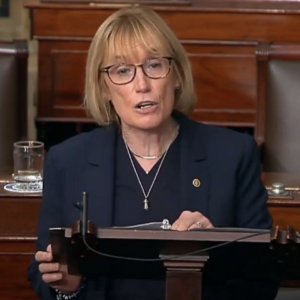Sen. Maggie Hassan is a solid supporter of President Joe Biden’s $500 billion plan for a taxpayer-funded college loan bailout. But you wouldn’t know it from her social media.
While her fellow Democrats like Sens. Elizabeth Warren (D-Mass.) and Bernie Sanders (I-Vt.) joined progressive Reps. Ayanna Pressley (D-Mass.) and Ilhan Omar (D-Minn.) outside the Supreme Court Tuesday to urge a ruling in favor of the Biden plan, Hassan was a no-show and a “no comment.”
Last summer, with what appeared to be a competitive race for re-election ahead of her, Hassan ended her silence on the controversial issue and endorsed Biden’s plan to have taxpayers pay for up to $20,000 in loans taken out by college students. That loan forgiveness would extend to couples earning as much as $250,000 a year.
“While I do not support canceling all student debt–believing instead that we need to focus on targeted relief and bringing down the cost of higher education—the administration’s announcement is a balanced compromise approach that will help those who need it the most,” Hassan said in a statement last August.
All told Biden’s plan would cost taxpayers an estimated half a trillion, on top of the $100 billion he has already spent allowing debtors to skip payments during the COVID “emergency.”
The debt forgiveness debate was at the center of American politics Tuesday as the Supreme Court heard two cases dealing with Biden’s plan. Supporters like the president say letting borrowers off the hook is “about giving people a fair shot.” Opponents say there is nothing “fair” about letting people borrow tens of thousands of dollars, spend four years partying at college, and then forcing taxpayers — most of whom don’t have a college degree — to cover the costs afterward.
“It is irresponsible and disrespectful to force working-class Americans — many of whom didn’t attend college — to pay the debts of high-income, college-educated Americans,” wrote Daniel Garza, president of The LIBRE Initiative. He also noted “Hispanic households only owe about 6 percent of student-loan debt,” which means working-class Latino taxpayers would cover loans taken out by White suburban college students.
Supreme Court Chief Justice John Roberts also raised the fairness issue during Tuesday’s oral arguments. He presented Biden’s attorney with a hypothetical scenario involving one person who borrowed to pay for college and another who borrowed to start a lawn service business.
“We know statistically that the person with the college degree is going to do significantly financially better over the course of life than the person without. And then along comes the government and tells that person, ‘You don’t have to pay your loan,'” Roberts said. “Nobody’s telling the person who is trying to set up the lawn-service business that he doesn’t have to pay his loan.”
How does Hassan defend the policy? She doesn’t say. There is no mention of her support for the plan on her social media or her Senate website — not on Tuesday, not this week, and not this year. And she has repeatedly refused to answer any questions about her support for the policy.
Hassan’s fellow Granite State Democrats haven’t been nearly as shy.
“It’s time to #CancelStudentDebt and then make every step towards #FreeCollege today,” tweeted state Rep. Robin Vogt (D-Portsmouth).
Economists aren’t as excited about the plan.
“The stark reality is that “forgiving student debt” really means forcing people who didn’t go to college to pay for those who did, and forcing people who scrimped and saved for college to pay for those who didn’t,” wrote economists Antony Davies and James Harrigan. “This punishes prudent, frugal choices while rewarding their opposite.”



